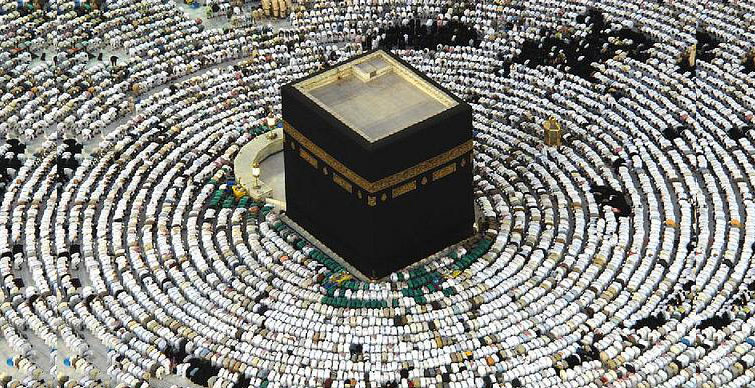
The death of nearly 1,000 pilgrims in the Hajj in Mecca, Saudi Arabia, obviously indicates that Allah is displeased with this annual hoopla.
Jack Cohen – End of Hajj & Israel Arab Relations
The death of nearly 1,000 pilgrims in the Hajj in Mecca, Saudi Arabia, obviously indicates that Allah is displeased with this annual hoopla. Of course, the pilgrims go for religious purposes, but the value of the Hajj to the Saudis in purely financial terms, as well as its political significance, far outweighs its religious aspects. After all, do people nowadays really need to trek miles in the heat with millions of other people and then (get this) throw stones at a concrete pillar to symbolically show their contempt for the devil? This is nonsense, most pilgrimages, of Jews to Jerusalem, of Christians to …Jerusalem, of Catholics to Rome, of Anglicans to Canterbury, have long since died out. It is a feature of Islam, one of the seven pillars of its basic tenets, that believers in Allah (and followers of Mohammed his prophet) are required to once in their life attend the Hajj. So that means that once the Muslims have taken over Europe, all the European Muslims will be required to make the trek to Mecca. All 450 million of them, together with the other 1.2 billion Muslims around the world.
Of course, no-one will listen to me, but, if they will ignore Allah’s message it will be at their own risk. He has caused cranes to fall on people, he has caused huge stampedes (everything is controlled by Allah) and yet they have not even considered calling off the Hajj. But I predict that as the Hajj grows in size and the Saudis ability to handle the massive crowds decrease, there will be even greater accidents and loss of life. Allah, the all powerful, the mighty has spoken (or was that the Wizard of Oz?).
Israeli Arab Relations
President Al-Sisi of Egypt has issued an important statement urging the other Arab countries to follow Egypt’s example and make peace with Israel without making the condition that the Palestinian problem be solved first. I totally agree with him and I have always maintained that those who say “Palestine first” are making a huge mistake. In effect it is delaying an accommodation between Israel and the Arab States indefinitely, since no solution of the Palestine conflict is foreseeable. On the contrary, once normal relations are established between Israel and the Arab States a solution to the Palestine conflict becomes much more likely.
At present there are definite common interests between Israel and Egypt, most notably a common enemy in the Muslim Brotherhood and their offshoots in Sinai, including an Islamic State affiliate that is actively fighting the Egyptian Government and killing Egyptian soldiers and civilians. Egypt believes that Hamas in Gaza, itself the Palestinian affiliate of the MB, is aiding the insurrection in Sinai and Egypt itself, and is fighting back. Israel is aiding Egypt in this war, not only by suspending specific clauses in the Israel-Egyptian peace treaty allowing Egypt to bring heavy arms into Sinai, but also with intelligence and other means. The fact that Egypt has closed down most of the smuggling tunnels between Egypt and Gaza and has recently flooded those tunnels near the Mediterranean Sea shows that their intentions are serious.
In a similar manner, there are definite common interests between Israel and the other major Sunni Arab States, namely Saudi Arabia, Kuwait and the other Gulf States, Bahrain, the UAE and Oman (Jordan does of course already have a peace treaty with Israel). Most notably the threat of Iranian hegemony due not only to its expansionist policies and support of terrorism, Hizbollah in Lebanon, Hamas in Gaza and the Houthis in Yemen, but also its aim to develop nuclear weapons (no-one in the region trusts the recent US deal with Iran to prevent this). Saudi Arabia is already fighting its part in the war against the Houthis in Yemen, and these States feel the power vacuum left by Pres. Obama’s policy of withdrawal (retreat) from the region. This vacuum has so far been filled by Russia in Syria and Iran in Syria and Yemen. Israel is the only local power that itself can compete with Iran, since the Saudis and Egyptians are not in the same league. So it is natural that these enemies of Iran should huddle together for mutual protection. It is this situation that is behind Al-Sisi’s advice to his Arab brethren.
Even if they do take Al-Sisi’s advice, that does not mean that peace will break out all over or that the Palestine problem would be solved overnight. But, if there were an accommodation between Israel and Saudi Arabia and the Gulf States that would certainly give Iran something to think about. The idea of Israeli jets near their border instead of Iranian fighters near Israel’s border, would definitely change the strategic balance.

Born in London, UK, lived in suburban Washington DC area for 30 years, moved to Israel in 1996. He has a web site: Jack’s Blog








